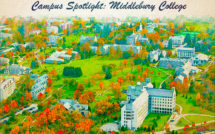
Literary Feasts: Representations of Food in Modern Narrative

This is part of our Campus Spotlight on Middlebury College.
I have taught this course in various formats: as a semester 3-days (50 min) or 2-days (75 min) per week class, or as an intensive 2 hours class 4 days a week during the shorter Winter Term (4 weeks). For larger groups, it works better with the 2 days per week schedule, as it allows for more discussion time (which I often organize in small groups to maximize time and allow everybody to speak and participate). Screenings are always outside of class.
Each unit/week introduces and prepares the grounds for the next one. For example, Week 3 discussion about the cook as an artist searching for perfection has already been anticipated when discussing Eat Drink Man Woman in Week 2, and is reprised in Week 7 when watching Big Night, or in Week 8 when discussing Tampopo and Jiro’s Dreams of Sushi.
Besides class participation, the main assignments for assessment are a journal, a midterm, an oral presentation (usually done in pairs) and a final project. Throughout the semester, students keep a journal where they respond to the readings and films, or reflect on class discussion. The journal is often brought to class, and entries or questions are shared in small group discussions. I check and collect the journals twice. The final project is inspired by the reading of several short stories and consists of a personal food story. I provide precise guidelines for content and formatting, and collect all the stories in a shared folder on our Canvas site. Students really enjoy reading each other’s food-related story and creating their own collection of literary feasts.
—Sandra Carletti
Food and life experiences are inextricably linked. In this course, we will examine the ways in which literature uses food to represent and understand the human experience We will focus on the various symbolic functions of food associated with the images of cooking, eating, drinking, and feasting presented in these literary works. Class discussion will be supplemented by the viewing of films about food and eating, and by the reading of secondary-critical material that will help us to frame our literary discussion while expanding it toward contemporary food issues (sustainability, food security, ethnicity, national identity, etc.). The course will include a few events related to the main theme of our investigation, such as a guest lecture and a dinner. There will be a midterm, an oral presentation and a final project (details will be explained in class). Attendance to class, screenings and other events is mandatory. Students will keep a journal throughout the semester (I will discuss the details on the first day of class). Students with advanced work in Italian can read some of the materials, and write one paper, in Italian.
Texts (at the bookstore)
- Laura Esquivel, Like Water for Chocolate
- Tomasi Di Lampedusa, The Leopard
- Linda Furiya, Bento Box in the Heartland
- Joanne Harris, Chocolat
- Suggested: B. Marranca, ed., A Slice of Life. Contemporary Writers on Food
On Canvas
- Isak Dinesen, Babette’s Feast
- Ernest Hemingway, “Hunger Was a Good Discipline”
- Elisabeth Telfer, Food for Thought. Philosophy and Food (chapters)
- Elio Vittorini, Conversations in Sicily (excerpts)
- Sarah Kofman, Rue Ordener Rue Labat (excerpts)
- Selections from :
- A.V. Avakian, ed., Through the Kitchen Window. Women explore the Intimate Meaning of Food and Cooking
- De Salvo & E. Giunta, eds., The Milk of Almonds. Italian American Women Writers on Food and Culture
- Michael Pollan, The Omnivore Dilemma
Other materials will be made available on Canvas as needed.
Films
- Babette’s Feast, Denmark, 1987, Dir. Gabriel Axel
- Eat, Drink, Man, Woman, Taiwan, 1994, Dir. Ang Lee
- Chocolat, UK/USA, 2000, Dir. Lasse Hallstrom
- Il Gattopardo, Italy, 1963, Dir. Luchino Visconti (selected clips)
- Big Night, USA, 1998, Dir. Stanley Tucci and Campbell Scott
- Jiro’s Dreams of Sushi, USA, 2011, Dir. David Gelb.
- Tampopo, Japan 1985, Dir. Yuzo Itami
- Like Water for Chocolate, USA, 1992, Dir. Alfonso Arau
Suggested:
- Fast Food Nation, USA 2007, Dir. Richard Linklater
- Food, Inc. USA 2008, Dir. Robert Kenner
- Fresh, USA 2009, Dir. Ana Sofia Joanes
- Tortilla Soup, USA 2001, Dir. Maria Ripoli
- Soul Food Junkies, USA 2013, Dir. Byron Hurt
- Mostly Martha, Germany 2001, Dir. Sandra Nettelbeck
- Kings of Pastry, France-UK 2010, Dir. C. Hegedus, D.A. Pennebaker
- East Side Sushi, USA 2014, Dir. Anthony Lucero
SAMPLE SYLLABUS – FIRST 8 WEEKS
“All human history attests
That happiness for man -the hungry sinner!-
Since Eve ate apples, much depends on dinner.”
–Lord Byron, Don Juan
WEEK 1 – Nourishing the Body, Nourishing the Mind
What are Food Studies? Food in literature and other disciplines. Hunger and satiety.
Readings:
- MFK Fisher, Foreword from The Gastronomical Me
- Ernest Hemingway, “Hunger was a good discipline”
- MFK Fisher, “Define this Word”
WEEK 2 – Food as Communication
Food is not just something to eat. Food writing is not just about food.
Readings:
- Betty Fussell, “Eating my Words”
- Jay Parini, “Writing in Restaurants”
- Adrienne Lehrer, “The Semiotics of Food and Drink”
Film: Eat Drink Man Woman
Optional: Tortilla Soup (based on Eat Drink Man Woman)
WEEK 3 – Food as Art, The Chef as Artist
The aesthetics possibilities of food. Food and the senses.
Readings:
- Isak Dinesen, Babette’s Feast
- Elisabeth Telfer, “Food as Art”
- Aaron Meskin, “The Art and Aesthetics of food”
- Francis Lam, “Some questions about Cooking and Art”
Film: Babette’s Feast
Suggested: Kings of Pastry, documentary
WEEK 4 – Food as Pleasure. Gluttony and Temperance.
Sinful, indulgent, and religious eating.
Readings:
- Joanne Harris, Chocolat
- Elisabeth Telfer, “The Pleasures of Food” and “Temperance”
- Priscilla Parkhurst Ferguson, “The Perils and Pleasures of Food”
Film: Chocolat
WEEK 5 – Much Depends on Dinner
Deciphering meals: banquets, rituals, class, and national identity. Food and sensuality.
Readings:
- Tomasi Di Lampedusa, The Leopard
- G.P. Biasin, “A Wise Gourmet”
- Mary Taylor Simeti, “At the Prince’s Table: Food in The Leopard”
Film:
Selections from Il Gattopardo
WEEK 6 – Food and Memory
The taste of home: childhood, family traditions, and religious practices
Readings:
- Elio Vittorini, Conversations in Sicily
- Sarah Kofman, Rue Ordener Rue Labat
- Marcel Proust, Remembrance of Things Past: Swann’s Way (excerpt)
- Jon D. Holtzman, “Food and Memory”
- Brangwen J. Stone, “Food, Culture, and Identity in Vittorini’s Conversations in Sicily and Kofman’s Rue Ordener, Rue Labat”
WEEKS 7 and 8 – Our Foods, Our Selves
What we eat and how we eat it is a reflection of who we are. Feeding and comforting our ethnic selves. Eating the ‘other’.
Readings
- Lynda Furya, Bento Box in the Heartland
- Selection from The Milk of Almonds
- Anne Allison, “Japanese Mothers and Obentos: the Lunchbox as Ideological State Apparatus”
- Donna Gabaccia, from We are what we eat. Ethnic Foods and the Making of Americans: Introduction “What do We Eat?”
- Harvey Levenstein, “The American Response to Italian Food, 1880-1930”
- Netta Davis, “To serve the Other: Chinese-American Immigrants in the Restaurant Business.”
Films:
- Tampopo
- Big Night
- Jiro Dreams of Sushi
- Optional: West Side Sushi
Sandra Carletti is Professor of Italian at Middlebury College. She received her Laurea in Literary Studies from the University of Bologna, and her M.A. and Ph.D. in Italian from the Johns Hopkins University. At Middlebury, she teaches a variety of courses in Italian language; modern and contemporary literature and culture; and in food studies. Her current research interests focus on food as a marker of cultural identity, particularly on the role of regional cuisine in the shaping of Italian identity and in its perception abroad.
Photo: Image: Pieter Claesz, Tabletop Still Life with Mince Pie and Basket of Grapes, 1625




